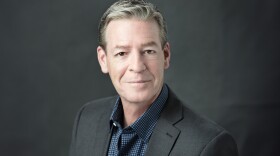Demetria Obilor’s media experience combined with her culturally diverse background add up to a unique — and ascending — television personality. As the second season of Revolt TV’s “Black Girl Stuff” ramps up, Obilor sat down with Desert Companion to talk about co-hosting the show, her vision of media for Gen Z audiences, and Las Vegas’ influence on her work.
You’ve been working in broadcast media since college. What drew you to journalism?
It’s just something I’ve always loved. I’m a people person! One of my first jobs here was working at Target on Spring Mountain and Rainbow — that was my first job ever. And I love that because all you do is talk to people all day. And when you work in this field of broadcast journalism, unscripted TV, all you do is interact with people … Not just my co-workers, but you’re speaking to an audience. (And) throughout my career in journalism, I had to earn a voice, which got me recognized by lots of people. And you just keep building from there … from scratch.
A lot of people have family in this business, and you see it, and it’s excellent that they’re able to set their children up that way. But when you’re starting from scratch, and you have no connections, it’s just like, This is a lot of hard work! And that’s what it’s truly been. I’ve been working since I was 16 years old.
What’s it like to be a woman of color in broadcast journalism?
I never let it box me in when I was in journalism school … I remember my professors — and they were not trying to harm me, they were not racist — telling me, “Demetria you’re never going to get a job as an anchor if you wear your hair natural. You’re going to have to straighten it, or you’re going to have to get a wig.” And some people would take that to heart maybe and say, “Well, then I never stand a chance. I’m going to switch majors right now.” (But for) me, that went over my head. That has nothing to do with me. I don’t put myself in a box. I’m not going to limit myself to this. Those might be rules that apply to you, but I believe in my talent. And I’m going to keep going, and I’m not straightening my hair.
Of course, you get nasty comments from viewers. You’ll be on the anchor desk and people will send you the nastiest things. I remember one email I got working in Las Vegas where a man said, “I can’t believe hair like that can be cleaned properly. Every time she’s on the screen I have to fast forward.” And that’s just one sample … But luckily, I don’t let that stuff get to me. And it’s been rewarding, because then I see young children who come and say, “Oh my god, I can wear my hair like this,” or “my hair is beautiful.”
One of your latest projects, the show “Black Girl Stuff,” speaks candidly on issues facing Gen Z women of color. Talk about the rationale behind a talk show for this specific generation?
When I spoke with the Creator, Monique Chenault, and when she was recruiting me for the show, she was looking for people (who), first of all, could showcase just some portions of the young Black experience, because the show targets young Black Millennial and Gen Zers. But it really is for everyone … because we were talking about subjects that touch everybody … And I feel like you don’t always see that on talk shows. You really couldn’t compare us to “The Real,” because I feel like we’d get a bit deeper on certain subjects. And it would be a bit more raw. (With Gen Z) I feel like that’s an audience that’s obviously not represented well on TV … and they have an appetite for different things … This is a generation who is telling their stories and telling their truths, and it’s so open. And I think that’s what “Black Girl Stuff” is really about.
You’ve lived in Las Vegas since you were 15, after moving here from Kansas City. You now consider the city to be home. How has living here shaped your approach to entertainment and media?
I feel like how Vegas has influenced me the most is because it’s a mini melting pot. I’m not going to take away from the Strip, because I love the Strip … But I feel like when I first came here, the racial demographic was so different. My friends (here are) Korean, Vietnamese. In Kansas City, my school was mostly white and black. Here, there are so many different demographics … But I have become a very well-versed, well-rounded person, because I’ve been around so much … When I talk about entertainment, (people) might be surprised about my knowledge of South Korean horror films and Japanese war films and Filipino culture, and so I can bring that if I’m talking about a story … And then you can bring people in more cohesively, I wouldn’t have been able to do that if I stayed in Kansas City.









